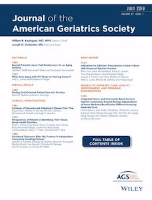
JOURNAL OF THE AMERICAN GERIATRICS SOCIETY
Scope & Guideline
Pioneering Research in Aging and Health
Introduction
Aims and Scopes
- Research on Aging and Geriatric Health:
The journal publishes studies related to the biological, social, and psychological aspects of aging, with a focus on improving health outcomes for older adults. - Interventions and Clinical Practice:
JAGS emphasizes innovative interventions and clinical practices, exploring effective strategies for managing chronic conditions and enhancing the quality of life in older populations. - Policy and Health Systems Research:
Research that informs health policy and systems of care for older adults is a key focus, addressing disparities in healthcare access and quality. - Education and Training in Geriatrics:
The journal highlights the importance of education and training for healthcare professionals in geriatrics, aiming to improve competency in caring for older patients. - Multimorbidity and Polypharmacy:
A significant area of research includes the management of multimorbidity and polypharmacy, emphasizing safe medication practices and deprescribing strategies.
Trending and Emerging
- Telehealth and Technology Integration:
The rapid adoption of telehealth and digital tools during the COVID-19 pandemic has spurred research on their effectiveness and accessibility for older adults, indicating a significant trend towards technology in geriatric care. - Age-Friendly Health Systems:
The implementation of age-friendly health systems, particularly the 4Ms framework (What Matters, Medication, Mentation, and Mobility), is gaining traction, emphasizing patient-centered approaches in geriatric care. - Health Disparities and Social Determinants of Health:
There is a growing focus on health disparities and the social determinants of health, particularly how they affect access to care and outcomes for older adults from diverse backgrounds. - Mental Health and Cognitive Functioning:
Research exploring the intersection of mental health, cognitive decline, and aging is expanding, highlighting the importance of psychological well-being in geriatric populations. - Community-Based Interventions:
There is an increasing emphasis on community-based interventions that address social isolation, caregiver support, and health promotion for older adults, reflecting the shift towards holistic care models.
Declining or Waning
- Traditional Pharmacotherapy Approaches:
There is a noticeable decrease in studies focused solely on traditional pharmacotherapy for geriatric populations, as the field increasingly emphasizes holistic approaches and non-pharmacological interventions. - General Population Studies:
Research that focuses on geriatric issues within broader populations is waning, with a shift towards targeted studies that focus specifically on older adults and their unique health challenges. - Aging Stereotypes and Social Perceptions:
While important, the exploration of aging stereotypes and social perceptions in healthcare settings appears to be less prevalent, potentially overshadowed by more pressing clinical and policy issues. - Single Disease Focus Studies:
Research concentrating on single disease focus, such as isolated Alzheimer’s disease, is declining in favor of studies addressing multimorbidity and the interactions between multiple health conditions.
Similar Journals

DRUGS & AGING
Exploring effective medications to support aging populations.DRUGS & AGING is a premier journal dedicated to the rapidly evolving field of geriatric pharmacology and the effective management of medications for older populations. Published by ADIS INT LTD, this journal stands out as a critical resource for researchers, healthcare professionals, and students focused on the intersection of aging and pharmacotherapy. With an impressive impact factor reflected in its ranking within the top quartile for both Geriatrics and Gerontology, and Q1 in Pharmacology (Medical), DRUGS & AGING provides a reputable platform for the dissemination of vital research from its inception in 1991 and extending through 2024. The journal features rigorous peer-reviewed articles, systematic reviews, and original research that cover a broad scope of topics, from medication efficacy in elderly patients to innovations in age-related drug therapies. As an influential publication with strong Scopus Ranks—positioned 90 out of 272 in Pharmacology and 41 out of 116 in Geriatrics—DRUGS & AGING plays an indispensable role in informing and advancing the effective and safe use of drugs in aging populations, ultimately aiming to improve the quality of life for older adults worldwide.
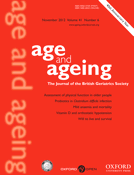
AGE AND AGEING
Unraveling the Complexities of AgeAGE AND AGEING is a premier peer-reviewed journal published by Oxford University Press, dedicated to advancing the field of gerontology and related medical disciplines. With its ISSN of 0002-0729 and E-ISSN 1468-2834, the journal has established itself as a critical platform for disseminating innovative research since its inception in 1972. It boasts impressive rankings within the Q1 category in Aging, Geriatrics and Gerontology, and Miscellaneous Medicine, reflecting its influential position in the scientific community. Researchers and practitioners alike value the journal's focus on the clinical, biological, and social aspects of aging, providing a multidisciplinary approach essential for addressing the challenges of an aging population. The journal maintains a significant impact factor, demonstrating its contribution to scholarly communication and knowledge dissemination. Although it does not operate under an open access model, AGE AND AGEING remains an essential resource for those committed to understanding the complexities of aging and enhancing the quality of life for older adults.

Salmand-Iranian Journal of Ageing
Pioneering insights into gerontology and geriatrics.Salmand-Iranian Journal of Ageing is a pioneering open-access publication dedicated to advancing the knowledge and understanding of ageing and geriatric health. Launched in 2006 by NEGAH INST SCIENTIFIC COMMUNICATION, this journal serves as a vital resource for researchers, professionals, and students within the fields of Geriatrics and Gerontology. Published in Iran, it aims to provide a platform for disseminating innovative research and clinical findings pertaining to ageing, with a commitment to accessibility and scholarly excellence. The journal holds recognition in its category with a Q4 designation in Aging and a Q3 classification in Geriatrics and Gerontology (2023), indicating its growing influence in academic circles. Despite a current H-index designation of '-', the journal's impact within its scope continues to develop. As it converges research efforts from 2018 to 2024, it seeks to address the pressing challenges faced by the ageing population. With no cost barriers for readers, the Salmand-Iranian Journal of Ageing remains an essential tool for fostering dialogue and collaboration in the quest for improved senior health outcomes.

Turkish Journal of Geriatrics-Turk Geriatri Dergisi
Championing the well-being of older adults.The Turkish Journal of Geriatrics (Türk Geriatri Dergisi), with ISSN 1304-2947 and E-ISSN 1307-9948, is a distinguished scholarly publication dedicated to the field of geriatrics and gerontology, proudly published by the Turkish Geriatrics Society. Established to foster knowledge and research in the aging population, this journal plays a crucial role in disseminating significant findings and advancements in the medical care of elderly individuals. Since its inception in 1998, the journal has committed to high-quality, peer-reviewed articles that explore diverse aspects of geriatric medicine, contributing vital insights to practitioners and researchers alike. Although it currently holds a Q4 ranking in the category of Geriatrics and Gerontology, the Turkish Journal of Geriatrics is on an upward trajectory, making it an essential resource for those specializing in the care of older adults. Researchers and professionals are encouraged to explore its rich archive and benefit from the open-access publishing model, promoting broader access to impactful research. For those invested in the well-being of the elderly, the Turkish Journal of Geriatrics serves not only as a platform for scholarly communication but also as a catalyst for innovation in geriatric care.

Canadian Geriatrics Journal
Bridging research and practice in geriatrics.Canadian Geriatrics Journal, published by MULTIMED INC, is a prominent platform dedicated to advancing the field of geriatrics and gerontology. With its esteemed status as a Q2 journal in both Geriatrics and Gerontology categories for 2023, it ranks favorably within the academic community, holding a 73rd percentile in Nursing Gerontology and a 59th percentile in Medicine Geriatrics and Gerontology according to Scopus metrics. Since its inception in 2011, the journal has aimed to foster innovation and disseminate pivotal research that addresses the complexities of aging populations. Researchers, healthcare professionals, and students interested in the intricacies of geriatric care will find a wealth of open-access resources that contribute significantly to enhancing practice and care methodologies in Canada and beyond. With its address located at 66 Martin St, Toronto, ON L9T 2R2, Canada, the journal stands as a vital resource for stakeholders in the geriatric field.

Journal of Gerontology and Geriatrics
Enhancing Global Conversations on AgingJournal of Gerontology and Geriatrics, published by PACINI EDITORE, is a crucial resource for those dedicated to the study of aging and geriatric health. Since its inception in 2016, this journal has aimed to disseminate high-quality research and findings that address the intricate biological, social, and psychological aspects of aging. With ISSN 2499-6564 and E-ISSN 2499-6564, it strives to foster discussions that enhance our understanding of gerontology and geriatrics on a global scale, despite its current positioning in the Q4 quartile of academic rankings. Located in Pisa, Italy, the journal invites contributions from researchers, professionals, and students who are passionate about advancing knowledge in these critical fields. Although it currently does not offer open access, the journal plays a vital role in connecting the community with essential insights that guide both research and practice in geriatric care.
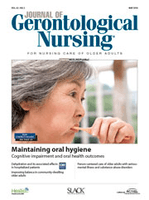
Journal of Gerontological Nursing
Championing Quality of Life for SeniorsThe Journal of Gerontological Nursing, published by SLACK INC, is a leading peer-reviewed journal dedicated to advancing the field of gerontological nursing through innovative research, clinical practice, and educational advancements. Since its inception in 1975, this journal has become a crucial resource for researchers, healthcare professionals, and students interested in the care and management of older adults. With an impact factor that reflects its significance within the disciplines of gerontology and nursing (Category Quartiles: Q3 in Gerontology and Q3 in Nursing), it serves as a platform for disseminating vital findings, best practices, and evidence-based approaches aimed at improving the quality of life for the aging population. While the journal maintains a print-only format, its content is invaluable for those looking to stay ahead in the rapidly evolving landscape of gerontological care. As it continues to publish until 2024, the Journal of Gerontological Nursing invites contributions that foster dialogue and innovation within this essential area of healthcare.
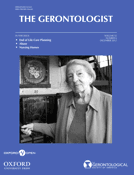
GERONTOLOGIST
Connecting Scholars to Enhance Aging ResearchThe GERONTOLOGIST, published by Oxford University Press Inc, is a premier journal in the field of geriatrics and gerontology, with a distinguished history since its inception in 1961. This esteemed journal stands out with its impressive Q1 rankings in prominent categories, including Geriatrics and Gerontology, reflecting its vital role in disseminating innovative research and advancing knowledge within these critical disciplines. With an impact factor that ranks it among the top journals in both Nursing Gerontology and Medicine, the GERONTOLOGIST serves as a key resource for researchers, professionals, and students dedicated to enhancing the health and well-being of older adults. Although it operates under a traditional access model, the journal remains committed to publishing cutting-edge studies that address the complexities of aging and inform evidence-based practices. By fostering a rich dialogue among scholars and practitioners, the GERONTOLOGIST is instrumental in shaping the future of gerontological research and policy.
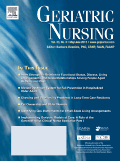
Geriatric Nursing
Advancing geriatric care through innovative research.Geriatric Nursing is a premier peer-reviewed journal dedicated to advancing the field of gerontology and nursing care for older adults. Published by MOSBY-ELSEVIER, this esteemed journal holds a significant place in the academic community with its Q2 ranking in both Gerontology and Medicine (miscellaneous) as of 2023, reflecting its importance and influence in the study and practice of healthcare for the elderly. With a comprehensive coverage extending from 1980 to 2024, Geriatric Nursing addresses the latest research, clinical practices, and policies impacting geriatric care, making it an essential resource for researchers, practitioners, and students alike. Although it does not provide open access options, its rigorous content garners attention with a Scopus Rank of #14 out of 39 in Nursing and Gerontology, placing it in the 65th percentile for its field. For those dedicated to improving the health and wellbeing of older populations, Geriatric Nursing remains a critical platform for innovation and knowledge dissemination.
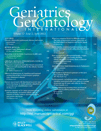
Geriatrics & Gerontology International
Innovating Research for a Healthier TomorrowGeriatrics & Gerontology International, published by WILEY, is a prestigious academic journal dedicated to advancing the field of geriatric and gerontological research. With a strong focus on the interdisciplinary aspects of aging, this journal has established itself as a leading source of high-quality research, reflected in its impressive impact factor and 2023 Scopus rankings, including a Q1 status in Health (Social Science) and Q2 in both Geriatrics and Gerontology. Since its inception in 2004 and continuous publication from 2008 to 2024, it has fostered a vibrant exchange of ideas among researchers, clinicians, and students alike. The journal serves as a critical resource for innovative studies, reviews, and commentaries that help shape policies and practices affecting the elderly population. It is essential reading for those dedicated to improving the quality of life for older adults and contributes significantly to the understanding of the complexities surrounding aging.